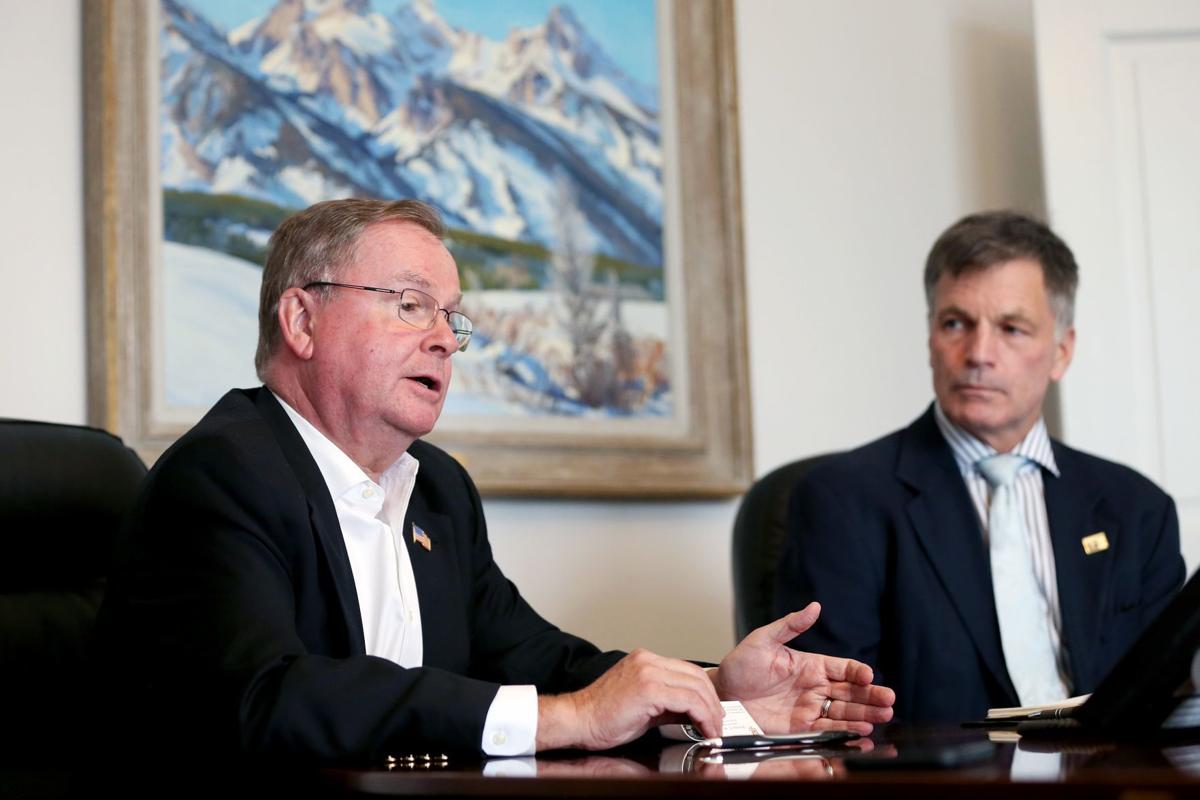Top Trump Energy Official Advocates for Coal Technology During Visit to Wyoming

By Camille Erickson
August 23, 2019 - Despite a tumultuous summer for the coal industry, a top energy official for the Trump administration says he remains optimistic about the commodity’s fortunes in Wyoming.
“Wyoming’s coal industry is going through a restructuring here, and everyone knows those restructurings are painful. They are,” said Steven Winberg, assistant secretary of fossil energy for the U.S. Department of Energy. “But at the end of the day, after that restructuring we will still be producing and utilizing coal from Wyoming.”

Steven Winberg, assistant secretary of fossil energy for the U.S. Department of Energy, speaks to reporters at a press conference Thursday in Cheyenne as Gov. Mark Gordon, right, looks on. Winberg also visited the University of Wyoming's School of Energy Resources.
Photo by Michael Cummo, Wyoming Tribune Eagle
Winberg made the comments Thursday during a visit to Wyoming, where he applauded the state’s cutting-edge research in fossil energy technology.
A leader in the movement to develop carbon capture and storage technology, Winberg visited the University of Wyoming’s School of Energy Resources. He also spoke alongside Gov. Mark Gordon at a press conference in Cheyenne, where they affirmed coal’s continued importance in the state’s economy and underlined the role advancements in carbon capture technology could play in sustaining Wyoming’s coal market into the future.
Winberg’s visit came at the tail end of a volatile summer for the state’s mining industry. In July, coal operator Blackjewel filed for bankruptcy and shuttered its two Wyoming mines indefinitely, leaving 600 miners out of work. Last week, the nation’s third largest coal company Cloud Peak Energy — once considered the pinnacle of stability among the Powder River Basin’s coal producers — sold off its mines to an out-of-state company.
But coal “is not going to go away any time soon,” the two public officials emphasized Thursday.
“You’ve seen a decline in the coal industry, but the pace of that is not indicating that it is going to close next year, or the year after, or the year after that,” Gordon told the Star-Tribune.
Asked specifically what would happen to the two Blackjewel coal mines idling in Campbell County, Winberg declined to make any predictions.
“Foreseeing whether the (mines) will reopen, my crystal ball is not very good,” he said.
In an effort to bolster Wyoming’s coal economy, the Trump administration is working to increase the export of coal and natural gas from the West Coast to markets in Asia, Winberg added.
“Markets in the Asian Pacific part of the world very much want Wyoming coal,” hesaid. “It is a higher quality coal, it is a cleaner coal than what they are currently are utilizing. And we could be shipping this high quality Powder River Basin coal out of the basin over to the West.”
But the movement to revive the export of Powder River coal hit another snag Tuesday when a Washington state appeals court denied a permit needed to open the Millennium Bulk Terminal in Longview, Washington, a critical exit point for Wyoming coal.
In his role at the federal agency, Winberg has championed the development of carbon capture and storage advancements. Carbon-related technology will accelerate in the next 10 to 20 years, due to recent federal legislation that incentivizes energy businesses to innovate, according to Winberg.
“I am very optimistic that we are going to see this technology advance at a pretty significant clip,” he said.
In a statement earlier this month, Gordon also expressed enthusiasm over the potential to commercialize the budding technologies coming from the state’s research hub. The Department of Energy has allocated funding for initiatives like Wyoming CarbonSAFE.
Still, some Wyoming analysts have cautioned public officials to maintain a realistic outlook for new carbon technology. The likelihood that the state can restore coal revenue to previous levels remains slim, several experts said.
“Maybe new coal products will be developed. Maybe we will find ways to monetize carbon that can offset the cost of carbon capture,” University of Wyoming economist Rob Godby said. “But even if those technologies were developed tomorrow, they wouldn’t benefit the market for five to 10 years. What I’m saying is a declining coal industry, we have to face that fact. But the bottom is still a ways off.”

